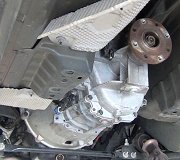Thanks for the reply. I am unfamiliar with the nuts and bolts of automatics; I've been around sticks since age 10 so I know about manual transmissions and how to know whether they work fine or have a problem. As for automatics well. I may need to learn now.
On second thinking my description was incorrect; if the torque converter multiplies torque it should allow the engine to rev faster when driving uphill (more power is needed), and conversely when going downhill. Still, I notice the shift being quite imperceptible now.
Thanks for the trans throttle note too. I re-read the Honda service manual and it says that it is permissible to adjust it to "shorten it" if desired (but by not more than 3 mm.) Now it will start moving the lever in the transmission as long as the throttle is moving.
So if I shorten it a little I would have a more immediate response to downshift when pressing the gas.
I replaced all the engine mounts a few months ago; vibration has not changed. Tried adjusting them twice (as per service manual) but it did not help
BMRFIXIT: The car is EFI but it does not have an EACV valve -the 89 accord has such a valve but not the 86. Instead, the 1986 has a idle valve that sits close to the brake booster with two hoses one coming from the air filter and the other going to the intake manifold. It opens when it is energized; if it is unplugged it closes and no extra air comes in.
As much as I dislike disassembling the transmission (it has no oil pan) your suggestion of inspecting the oil pump complements the service manual. If the oil pump is seizing or its screen is clogged with debris the symptoms would be the same, right?
Besides, sometimes I see operation of the idle valve when apparently there is no load on the engine. So there is some load coming from somewhere; what would happen if I do a stall test?
Thanks!
SPONSORED LINKS
Was this helpful?
Yes
No
Wednesday, March 6th, 2019 AT 5:49 PM
(Merged)




